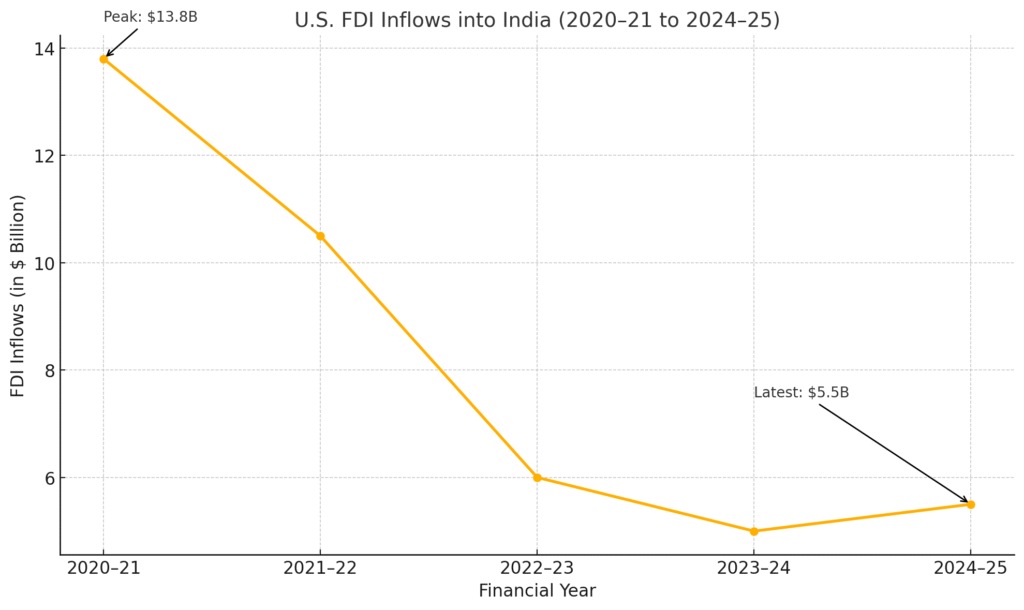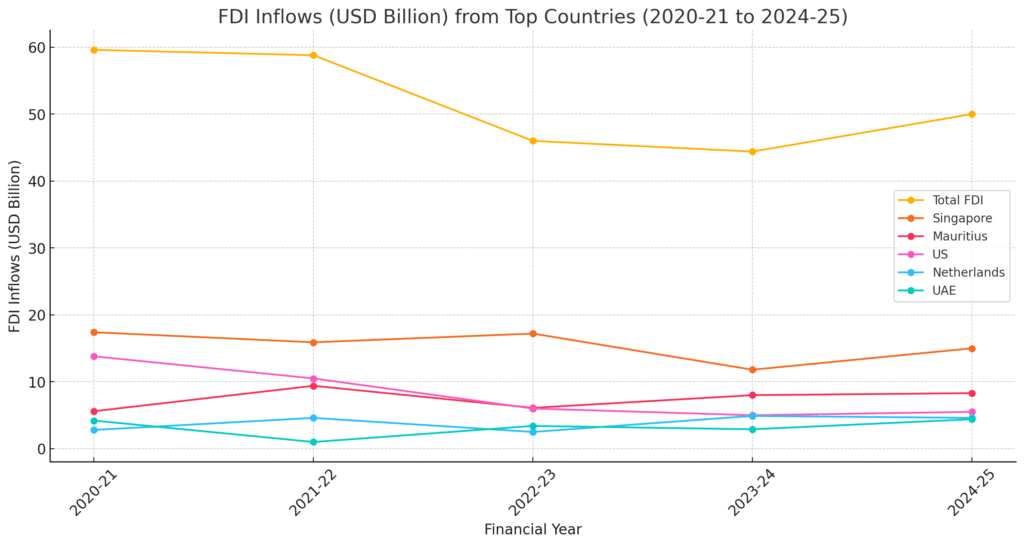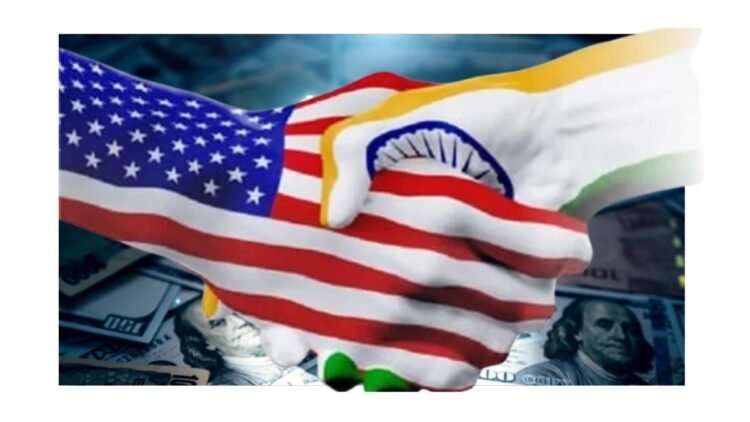The Role of FDI in India’s Economic Growth
The United States and India are often celebrated as strategic allies—bonded through democratic values, defense cooperation, and burgeoning trade. Yet, one key indicator of long-term partnership and mutual trust is revealing a troubling pattern: the consistent decline in U.S. Foreign Direct Investment (FDI) into India.

Foreign Direct Investment (FDI) serves as a critical driver of economic growth, fostering innovation, job creation, and infrastructure development in emerging economies like India. Among the key contributors to India’s FDI inflows, the United States has played a significant role, channeling substantial investments across diverse sectors. According to the RBI Annual Report 2024-25 from the FIBI, FDI from the USA to India has fluctuated over recent years, reflecting both global economic dynamics and India’s evolving investment climate.
According to the Reserve Bank of India’s (RBI) Annual Report for FY 2024–25, U.S. FDI in India stood at just $5.5 billion, a steep fall from $13.8 billion in 2020–21. Over five years, this translates into a 60% drop, at a time when India’s economy is growing at one of the fastest rates globally and is on track to become the fourth-largest economy by 2025.
In 2020-21, the USA contributed $13.8 billion to India’s total FDI of $59.6 billion, making it one of the top investors. However, this figure declined to $10.5 billion in 2021-22, $6.0 billion in 2022-23, $5.0 billion in 2023-24, and slightly recovered to $5.5 billion in 2024-25 (provisional). This downward trend, followed by a modest rebound, raises thought-provoking questions about the factors influencing U.S. investments in India and their implications for bilateral economic ties.
***
Understanding the Volatility in U.S. FDI
The decline in U.S. FDI from 2020-21 to 2023-24, a drop of nearly 64%, is striking when compared to other major investors like Singapore, which maintained relatively stable inflows, peaking at $17.2 billion in 2022-23. What drives this volatility? One factor could be global economic uncertainties, including supply chain disruptions and inflationary pressures in the U.S., which may have prompted American firms to adopt a cautious approach.
Additionally, India’s regulatory environment, while improving, still poses challenges such as bureaucratic hurdles and policy unpredictability, potentially deterring U.S. investors. Yet, the slight uptick in 2024-25 suggests renewed confidence, possibly fueled by India’s robust digital economy and strategic initiatives like “Make in India.”
The Five-Year Decline: A Numbers Perspective
Here is a table showing the year-wise U.S. FDI inflows into India and the percentage change from the previous year:
| Financial Year | FDI Inflows from U.S. (in $ Billion) | % Change from Previous Year |
|---|---|---|
| 2020–21 | 13.8 | – |
| 2021–22 | 10.5 | -23.91% |
| 2022–23 | 6.0 | -42.86% |
| 2023–24 | 5.0 | -16.67% |
| 2024–25 | 5.5 | +10.00% |

Sectoral Impact of U.S. Investments
Sector-wise, U.S. FDI has significantly impacted India’s economic landscape, particularly in technology-driven and high-value industries. The Annual Report highlights that computer services attracted $23.8 billion in 2020-21, a substantial portion likely from U.S.-based tech giants like Google, Microsoft, and Amazon, which have invested heavily in India’s cloud infrastructure and digital services.
Although inflows to this sector declined to $4.0 billion by 2024-25, the U.S. remains a key player, leveraging India’s vast talent pool and growing digital market. Financial services, another critical sector, saw inflows rise from $3.5 billion in 2020-21 to $7.8 billion in 2024-25, reflecting U.S. firms’ interest in India’s burgeoning fintech ecosystem. These investments underscore the strategic alignment between U.S. technological prowess and India’s digital ambitions, but they also raise questions about sustainability and equitable growth.
Here is the table showing country-wise FDI inflows into India from 2020–21 to 2024–25, along with the year-on-year percentage changes. This allows a clear comparison of investment trends and growth patterns across key source countries. Let me know if you’d like a chart version or a filtered table for specific countries.
| Source/Country | 2020-21 | 2021-22 | 2022-23 | 2023-24 | 2024-25 | % Change (2020-21 to 2021-22) | % Change (2021-22 to 2022-23) | % Change (2022-23 to 2023-24) | % Change (2023-24 to 2024-25) |
|---|---|---|---|---|---|---|---|---|---|
| Total FDI | 59.6 | 58.8 | 46.0 | 44.4 | 50.0 | -1.34 | -21.76 | -3.47 | 12.61 |
| Singapore | 17.4 | 15.9 | 17.2 | 11.8 | 15.0 | -8.62 | 8.17 | -31.39 | 27.11 |
| Mauritius | 5.6 | 9.4 | 6.1 | 8.0 | 8.3 | 67.85 | -35.10 | 31.14 | 3.75 |
| US | 13.8 | 10.5 | 6.0 | 5.0 | 5.5 | -23.91 | -42.85 | -16.66 | 10.00 |
| Netherlands | 2.8 | 4.6 | 2.5 | 4.9 | 4.6 | 64.28 | -45.65 | 96.00 | -6.12 |
| UAE | 4.2 | 1.0 | 3.4 | 2.9 | 4.4 | -76.19 | 240.00 | -14.70 | 51.72 |
| Japan | 1.9 | 1.5 | 1.8 | 3.2 | 2.5 | -21.05 | 20.00 | 77.77 | -21.88 |
| Cyprus | 0.4 | 0.2 | 1.3 | 0.8 | 1.2 | -50.00 | 550.00 | -38.46 | 50.00 |
| Belgium | 0.4 | 0.2 | 0.2 | 0.1 | 1.1 | -50.00 | 0.00 | -50.00 | 1000.00 |
| Switzerland | 0.2 | 4.3 | 0.4 | 0.2 | 0.9 | 2050.00 | -90.69 | -50.00 | 350.00 |
| South Korea | 0.4 | 0.3 | 0.3 | 0.4 | 0.8 | -25.00 | 0.00 | 33.33 | 100.00 |
| France | 1.3 | 0.3 | 0.4 | 0.4 | 0.8 | -76.92 | 33.33 | 0.00 | 100.00 |
| UK | 2.0 | 1.6 | 1.7 | 1.2 | 0.8 | -20.00 | 6.25 | -29.41 | -33.33 |
| Germany | 0.7 | 0.7 | 0.5 | 0.5 | 0.5 | 0.00 | -28.57 | 0.00 | 0.00 |
| Cayman Islands | 2.8 | 3.8 | 0.8 | 0.3 | 0.4 | 35.71 | -78.94 | -62.50 | 33.33 |
| Luxembourg | 0.3 | 0.5 | 0.5 | 0.4 | 0.4 | 66.66 | 0.00 | -20.00 | 0.00 |
| Others | 5.4 | 3.7 | 2.9 | 4.3 | 3.0 | -31.48 | -21.62 | 48.27 | -30.23 |

***
Geopolitical and Social Dimensions
The broader implications of U.S. FDI extend beyond economics, touching on geopolitical and social dimensions. The U.S.-India partnership has strengthened in recent years, driven by shared interests in countering regional influences and fostering innovation. FDI serves as a soft power tool, deepening bilateral ties. However, the concentration of U.S. investments in high-tech and financial services prompts reflection on inclusivity.
While these sectors drive GDP growth, they often benefit urban, skilled populations, potentially exacerbating India’s urban-rural divide. Manufacturing, which could generate widespread employment, received only $12.1 billion in 2024-25, a modest increase from prior years but still lagging behind computer services. Should U.S. investors diversify into labor-intensive sectors to align with India’s job creation needs, or is the focus on high-tech a natural outcome of competitive advantage?
***
Competition for FDI Inflows
Another thought-provoking aspect is the competition for FDI. Singapore and Mauritius consistently outpace the U.S. in FDI inflows, partly due to their status as financial hubs with favorable tax structures. This raises questions about whether India’s Double Taxation Avoidance Agreements (DTAAs) with these countries inadvertently disadvantage U.S. investors. Furthermore, emerging players like the UAE, with $4.4 billion in 2024-25, are gaining ground, suggesting a diversifying investor base. How can India balance attracting U.S. capital while fostering a broader, more resilient FDI ecosystem?
***
Possible Reasons Behind the U.S. Pullback
1. Regulatory Uncertainty and Compliance Challenges
American corporations have often expressed concerns about India’s evolving regulatory environment. Sudden changes in taxation (including retrospective tax claims), uncertainty in data localization norms, and sector-specific FDI restrictions (e.g., e-commerce and digital services) have led to a trust deficit.
For U.S. investors used to transparent and rule-based environments, India’s bureaucracy and policy unpredictability may be acting as a deterrent.
2. Protectionist Measures and Market Access
India’s recent push for self-reliance (Atmanirbhar Bharat) has introduced protectionist tones in sectors like electronics, pharmaceuticals, and defense. While the goal is to strengthen domestic industry, it may inadvertently alienate foreign investors, especially those from countries like the U.S. where open market access is a priority.
3. Geopolitical Frictions and Strategic Hesitations
While Indo-U.S. relations have deepened diplomatically, U.S. investors remain cautious about India’s geopolitical balancing acts—especially its ties with Russia and China. Strategic misalignments can subtly influence capital flows, particularly in sensitive sectors such as semiconductors, AI, and defense manufacturing.
4. Digital Policy Concerns
The U.S. has repeatedly flagged issues with India’s approach to data governance, especially proposals to mandate local storage of user data and restrictions on cross-border data flows. Tech giants like Google, Amazon, and Meta are cautious about expanding capital commitments in a space where policy risk remains high.
***
Implications for the U.S.
1. Missing Out on the India Growth Story
By dialing down FDI, the U.S. risks marginalization in sectors where China, UAE, and even Japan are gaining ground. In a decade, India could become a $10 trillion economy. Failing to embed capital now may result in lost competitive advantage later.
2. Strategic Disconnect
If the U.S. seeks to counterbalance China in Asia, India is its most natural partner. But this partnership must be economically grounded, not just diplomatically endorsed.
3. Reassess Risk Appetite
U.S. investors may need to shift their approach—from short-term ROI to long-term strategic embedding. India’s scale, demographics, and consumption potential demand patience and persistence, not quick exits.
(Rusen Kumar is a Senior Journalist. )







